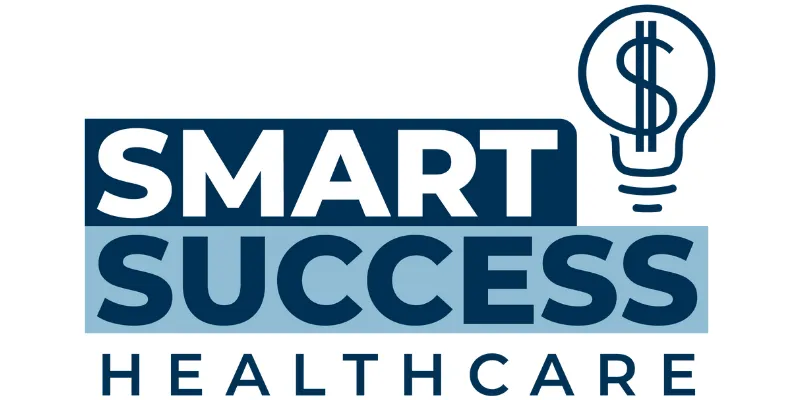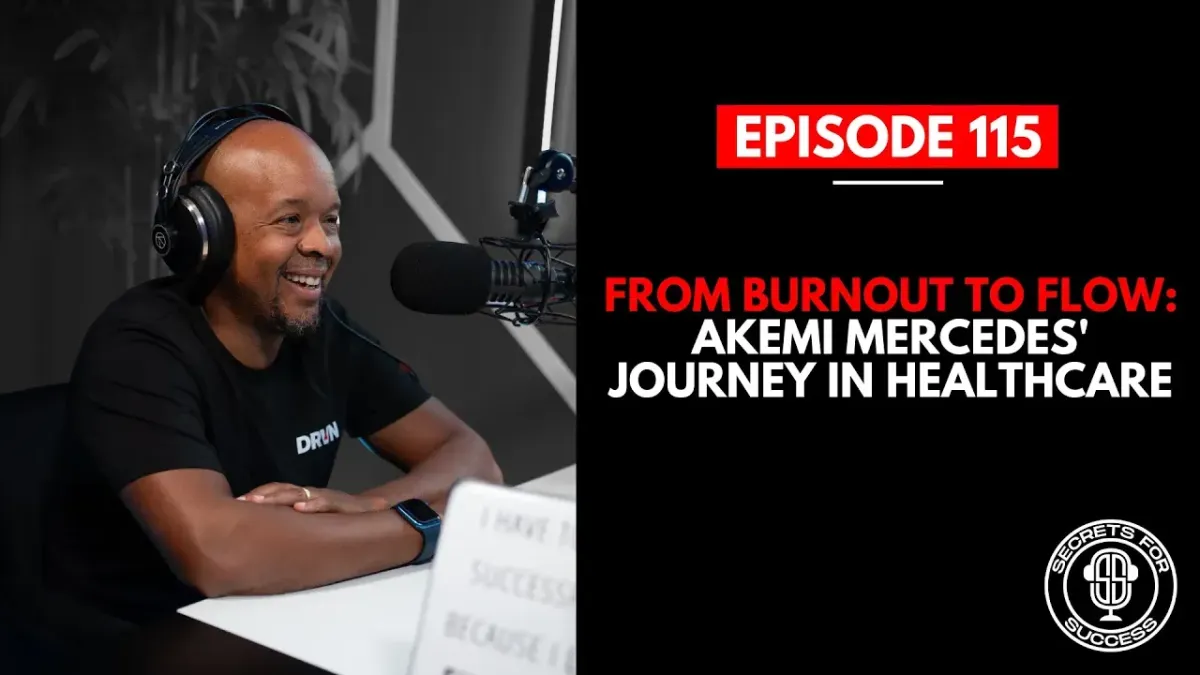
BLOG

From Burnout to Flow: Akemi Mercedes' Journey in Healthcare
Navigating Healthcare Burnout: The Flow State, Societal Pressures, and Finding Balance
In Episode 115 of SSHC, Greg Todd speaks with physical therapist Akemi Mercedes about the multifaceted experiences of burnout in the healthcare profession. Their conversation delves into the concept of the "flow state," the societal pressures contributing to mental health struggles, and the critical need for systemic changes to ensure sustainable work environments. This blog post aims to expand on these pivotal topics, shedding light on the complexities of working in healthcare and finding balance in a demanding career.
The Flow State: An Energizing Professional Experience
One of the key highlights of the discussion between Greg Todd and Akemi Mercedes was the concept of the "flow state." This state, characterized by complete immersion and engagement in an activity, is often experienced by healthcare professionals during direct patient interactions. Greg describes it as an exchange of energy that sustains focus and retention, making work feel almost effortless.
Akemi shares her moments of feeling "in flow" while treating patients, where the stresses of her job temporarily fade away. These interactions bring her deep fulfillment and emotional investment, which are essential components for maintaining passion in one's work. However, the challenge lies in bridging these positive experiences with the broader context of a demanding healthcare environment.
Societal Pressures and Mental Health Struggles
Both Greg and Akemi touch on the significant societal pressures that exacerbate stress and anxiety among healthcare professionals. Akemi recounts her harrowing experiences with burnout, severe anxiety, and physical symptoms, which ultimately led to a two-month medical leave. Similarly, Greg shares his own struggles with managing multiple clinics and handling up to 22 patients a day, resulting in overwhelming sensations akin to anxiety attacks.
These experiences underscore the need for open conversations about mental health, especially in professions where high productivity expectations are the norm. Cultural factors often prevent individuals, particularly men, from discussing mental health issues openly. By bringing these discussions to light, Greg and Akemi hope to dismantle the stigma and encourage a more supportive environment for mental well-being.
Systemic Changes for Sustainable Healthcare
A recurring theme in the episode is the unsustainable nature of the current healthcare system. Akemi describes her decade-long journey through various healthcare settings, facing relentless demands that prioritize administrative tasks over meaningful patient care. This cycle contributes to a pervasive sense of burnout and dissatisfaction among healthcare workers.
Greg emphasizes the need for significant changes to avoid the negative impacts of the current healthcare model on family life and personal well-being. He advises that maintaining presence at home and positive relationships requires lifestyle adjustments or significant financial wins, as the existing framework is untenable in the long run.
Finding Fulfillment Beyond the Struggles
Despite the challenges, Akemi’s story is also one of hope and renewal. During her medical leave, she discovered Greg Todd's five-day challenge, which became a turning point in her career. Initially skeptical, Akemi found value in the challenge and went on to engage further with Greg’s offerings, including attending live events.
These experiences provided Akemi and her partner, Carlos, with new perspectives on achieving work-life balance and reconsidering their financial priorities. Their journey highlights the importance of seeking out opportunities for growth and change, even in the face of adversity.
The Role of Community Support
Another vital aspect discussed in the episode is the role of community support. Akemi mentions a nonprofit organization, dontclockout.org, started by a former nurse to provide support for healthcare workers. The rapid growth and community backing of this initiative reflect a collective recognition of the need for support systems.
Building and participating in supportive communities can help healthcare professionals navigate the challenges of their demanding careers. These networks provide a space for sharing experiences, finding resources, and fostering resilience.
Conclusion
The conversation between Greg Todd and Akemi Mercedes sheds light on the intricate balance healthcare professionals must maintain to avoid burnout and find fulfillment in their work. The flow state, societal pressures, systemic challenges, and the importance of community support all play crucial roles in shaping their experiences.
As Akemi and Greg advocate, achieving sustainable healthcare requires both individual and systemic changes. By addressing these multifaceted issues, the hope is to create a more supportive, rewarding, and balanced environment for healthcare workers, ultimately benefiting both professionals and patients alike.
Watch Greg Todd's Video on From Burnout to Flow: Akemi Mercedes' Journey in Healthcare
Follow Greg on Socials:
https://www.Instagram.com/gregtoddpt
https://www.Facebook.com/gregtoddpt

From Burnout to Flow: Akemi Mercedes' Journey in Healthcare
Navigating Healthcare Burnout: The Flow State, Societal Pressures, and Finding Balance
In Episode 115 of SSHC, Greg Todd speaks with physical therapist Akemi Mercedes about the multifaceted experiences of burnout in the healthcare profession. Their conversation delves into the concept of the "flow state," the societal pressures contributing to mental health struggles, and the critical need for systemic changes to ensure sustainable work environments. This blog post aims to expand on these pivotal topics, shedding light on the complexities of working in healthcare and finding balance in a demanding career.
The Flow State: An Energizing Professional Experience
One of the key highlights of the discussion between Greg Todd and Akemi Mercedes was the concept of the "flow state." This state, characterized by complete immersion and engagement in an activity, is often experienced by healthcare professionals during direct patient interactions. Greg describes it as an exchange of energy that sustains focus and retention, making work feel almost effortless.
Akemi shares her moments of feeling "in flow" while treating patients, where the stresses of her job temporarily fade away. These interactions bring her deep fulfillment and emotional investment, which are essential components for maintaining passion in one's work. However, the challenge lies in bridging these positive experiences with the broader context of a demanding healthcare environment.
Societal Pressures and Mental Health Struggles
Both Greg and Akemi touch on the significant societal pressures that exacerbate stress and anxiety among healthcare professionals. Akemi recounts her harrowing experiences with burnout, severe anxiety, and physical symptoms, which ultimately led to a two-month medical leave. Similarly, Greg shares his own struggles with managing multiple clinics and handling up to 22 patients a day, resulting in overwhelming sensations akin to anxiety attacks.
These experiences underscore the need for open conversations about mental health, especially in professions where high productivity expectations are the norm. Cultural factors often prevent individuals, particularly men, from discussing mental health issues openly. By bringing these discussions to light, Greg and Akemi hope to dismantle the stigma and encourage a more supportive environment for mental well-being.
Systemic Changes for Sustainable Healthcare
A recurring theme in the episode is the unsustainable nature of the current healthcare system. Akemi describes her decade-long journey through various healthcare settings, facing relentless demands that prioritize administrative tasks over meaningful patient care. This cycle contributes to a pervasive sense of burnout and dissatisfaction among healthcare workers.
Greg emphasizes the need for significant changes to avoid the negative impacts of the current healthcare model on family life and personal well-being. He advises that maintaining presence at home and positive relationships requires lifestyle adjustments or significant financial wins, as the existing framework is untenable in the long run.
Finding Fulfillment Beyond the Struggles
Despite the challenges, Akemi’s story is also one of hope and renewal. During her medical leave, she discovered Greg Todd's five-day challenge, which became a turning point in her career. Initially skeptical, Akemi found value in the challenge and went on to engage further with Greg’s offerings, including attending live events.
These experiences provided Akemi and her partner, Carlos, with new perspectives on achieving work-life balance and reconsidering their financial priorities. Their journey highlights the importance of seeking out opportunities for growth and change, even in the face of adversity.
The Role of Community Support
Another vital aspect discussed in the episode is the role of community support. Akemi mentions a nonprofit organization, dontclockout.org, started by a former nurse to provide support for healthcare workers. The rapid growth and community backing of this initiative reflect a collective recognition of the need for support systems.
Building and participating in supportive communities can help healthcare professionals navigate the challenges of their demanding careers. These networks provide a space for sharing experiences, finding resources, and fostering resilience.
Conclusion
The conversation between Greg Todd and Akemi Mercedes sheds light on the intricate balance healthcare professionals must maintain to avoid burnout and find fulfillment in their work. The flow state, societal pressures, systemic challenges, and the importance of community support all play crucial roles in shaping their experiences.
As Akemi and Greg advocate, achieving sustainable healthcare requires both individual and systemic changes. By addressing these multifaceted issues, the hope is to create a more supportive, rewarding, and balanced environment for healthcare workers, ultimately benefiting both professionals and patients alike.
Watch Greg Todd's Video on From Burnout to Flow: Akemi Mercedes' Journey in Healthcare
Follow Greg on Socials:
https://www.Instagram.com/gregtoddpt
https://www.Facebook.com/gregtoddpt
Join us on our Social Media
platforms to learn and grow with Smart Success Healthcare
We help Physical Therapists, Occupational Therapists, Dietitians and Chiropractors achieve multi 6 to 7 figures per month with few staff, happy patients and great results!

Text us at 813-534-6453 or
© 2026 Smart Success Healthcare







